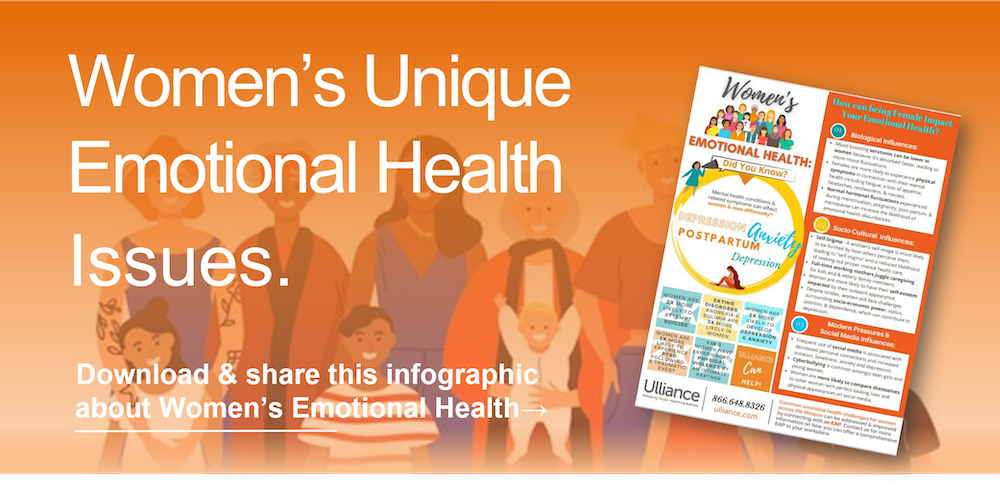Mental health impacts everyone at one time or another. Sometimes, like during a pandemic, it can affect (most) everyone simultaneously, yet each person will have a different experience. They will have different feelings, reactions, symptoms, stressors and outlooks, but the most significant disparity is between genders.
Researchers find that mental health disorders disproportionately affect women more than men throughout their lifespan for many reasons. Hormone fluctuations, domestic violence, sexual trauma during childhood, sexual trauma as an adult, societal stressors, career pressures, and family commitments, among others, are just some of the experiences women face.
Suffering in Silence
Women often feel too ashamed to seek help for mental illness, and many simply aren't aware their symptoms may be considered an illness and that treatment options are available to help them feel better.
As an HR professional, you may encounter women on your team that need a little extra help. Remember to use your resources and remind employees that your organization's EAP is great place to start when looking for support.
Don't have an EAP connect with us to learn more.
Women tend to think general unhappiness, anxiety, stress and depression go hand in hand with juggling a job, a significant other and responsibilities of family life. They believe the emotional and mental problems they face must be their silent struggle.
Mental health professionals now realize that women, even when suffering the same mental disorder as their male counterparts, require a different approach to treatment because they are affected by other influences.
3 Key Factors
Biological, cultural and societal factors contribute to a woman's mental well-being, and these factors continuously change throughout their lifetime.
1.) Biological Influences:
Historically mental illness diagnosis has been a one-size-fits-all regarding gender. Until recently, depression, anxiety, substance abuse, PTSD and other mental health problems were diagnosed and treated using the same criteria for men and women.
But the differences between genders don't stop with the anatomy. Gender-specific hormones cycle through women's brains, impacting thoughts, moods and feelings as the body also goes through physical changes.
Hormones fluctuate dramatically during different stages of a woman's life, and depression or other mental health issues can reoccur at any stage.
- Premenstrual Syndrome - or what most people know as PMS refers to moodiness and irritability several days before menstruation. Usually, the symptoms are mild, but the symptoms are severe enough to be disabling for some women. Increased anger, severely depressed mood, intense sadness, suicidal thoughts, bloating, breast tenderness and muscle pain come together to wreak havoc on a woman's mental health.
- Prenatal and Postpartum Depression – Pregnant women's hormones change quickly when a woman becomes pregnant, which causes morning sickness, mood swings and weight gain.
Once they have suffered nine months of fat fingers and weird cravings, the baby finally arrives, and their hormones begin to change again. Now they are dealing with sadness, anxiety and fear as they try to navigate the challenges of being a mother while battling exhaustion.
In severe cases of postpartum depression, the mother may be unable to carry out daily tasks, including caring for herself or the new baby and may need mental health intervention. - Perimenopausal Depression – The transition into menopause is a normal phase in every woman's life. During this phase, women experience abnormal mood swings, difficulty sleeping, depression, hot flashes, irritability, and overall loss of enjoyment.
Many unique biological and environmental influences can work in tandem with life stressors to cause mental distress throughout a woman's lifetime.
2.) Socio-Cultural Influences:
Women's issues can be any concern that might impact a woman's mental well-being. Problems can range from gender stereotyping to lack of financial, child, or career support.
Women are 10x more likely to be affected by depression and anxiety stemming from societal pressures than men. They also experience mental distress at higher rates than men in all age brackets.
(Good Therapy)
Likely, men and women don't experience mental health problems the same way because they experience life stress differently.
- In a 2015 study by Pattyn, it was determined that women experience more organizational stress while men experience more stress regarding issues surrounding the environment, such as pollution and draughts.
- Women also experience stress from circumstances unfamiliar to men including, gender-based violence, sexual assault, single parenthood (more often than men), lower workplace compensation and poverty.
- Other frustrations stem from feeling unable to fully utilize their skillsets at work, difficulty maintaining autonomy, and feeling like their workplace complaints are not addressed.
Fearing they may be stigmatized, women are often reluctant to seek treatment. Without treatment, the severity of depression and anxiety they are suffering increases dramatically, leading to further complications down the line.
3.) Modern Pressures and Social Media Influences:
Women tend to rely on the outside world's opinions for their self-esteem much more than men do. They fear others may think less of them, which, in turn, would cause them to think less of themselves. This is one of the main reasons women avoid seeking help for mental illness.
Social media is accessible all day, every day. It amplifies the cultural pressures that women not only grew up with but still feel today.
- Studies show that the number of social platforms a person is on and how long they spend on social media directly correlates to their mental health.
- Younger females (late teens and early '20s) feel bad about their bodies after comparing themselves to females on social media. Young women are particularly susceptible to eating disorders, and when feeling discouraged about their body, often develop anorexia.
- Women older than their mid-twenties feel inadequate about their work and feel their lives lack meaning after spending excessive time on social media.
Research shows that the ability to build healthy relationships, engage in conversation and develop other social skills suffer the more time spent on social media.
Social media interactions are poor substitutes for in-person, face-to-face time. Important social cues such as tone of voice, inflection, and interpreting body language are learned by spending time with others. Online interactions are all subject to personal interpretation, which is usually based on individual experiences.
Cyberbullying is common among young females. Girls may feel socially included for the first time and get drawn into social interactions only to be ridiculed and excluded.
Eventually, social media interactions may lead to feelings of isolation and loneliness. Girls begin to feel like they will never measure up to the images they see online and that their lives are worthless compared to others.
The Right Treatment
By utilizing a gender-based approach to treatment that focuses on specific symptoms unique to women and educating women about mental health issues, practitioners can break down the barriers preventing women from getting necessary care.
Teaching women coping skills can also help prevent minor problems from turning into major ones. Coping skills include teaching women how to take care of themselves through proper diet, sleep and exercise. When they are healthy, they can better cope with life stressors.
Gender-based treatments like behavioral cognitive therapies and medications have also been highly effective in getting women back on track to being happy and confident in themselves and their lives.
Hundreds of organizations support their employees through The Ulliance Life Advisor Employee Assistance Program (EAP). Investing in the right EAP to support your employees before, during and after they face adverse events will help them and help you. Visit www.ulliance.com, or call 866-648-8326.
When you partner with Ulliance, our Life Advisor Consultants are always just a phone call away to teach ways to enhance your work/life balance and increase your happiness. The Ulliance Life Advisor Employee Assistance Program can help employees and employers come closer to a state of total well-being.
Investing in the right EAP or Wellness Program to support your employees will help them and help you. Visit www.ulliance.com, or call 866-648-8326.
The Ulliance Employee Assistance Program can address the
following issues:
• Stress about work or job performance
• Crisis in the workplace
• Conflict resolution at work or in one’s personal life
• Marital or relationship problems
• Child or elder care concerns
• Financial worries
• Mental health problems
• Alcohol/substance abuse
• Grief
• Interpersonal conflicts
• AND MORE!
References
Depression in Women: 5 Things You Should Know. (n.d.). Retrieved from National Institute of Mental Health: https://www.nimh.nih.gov/health/publications/depression-in-women
The Impact of Age and Gender on Mental Health. (2020, July 22). Retrieved from McLean Hospital: https://www.mcleanhospital.org/essential/impact-age-and-gender-mental-health
Women. (2021). Retrieved from GoodTherapy: https://www.goodtherapy.org/learn-about-therapy/issues/women-issues
Women’s Mental Health 101: Statistics, Symptoms & Resources. (2020). Retrieved from Regis College: https://online.regiscollege.edu/blog/womens-mental-health/



